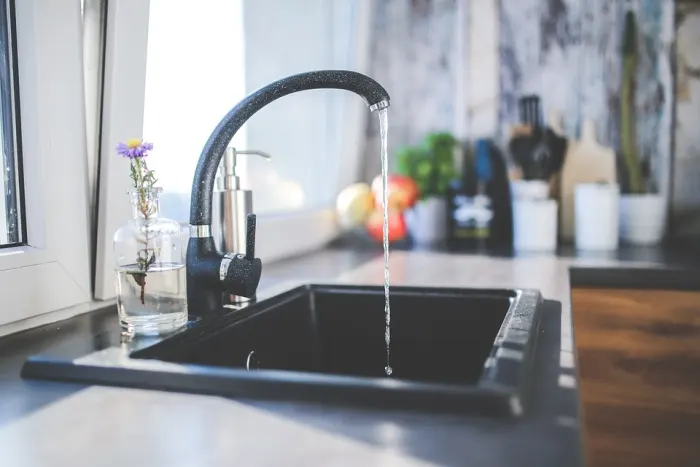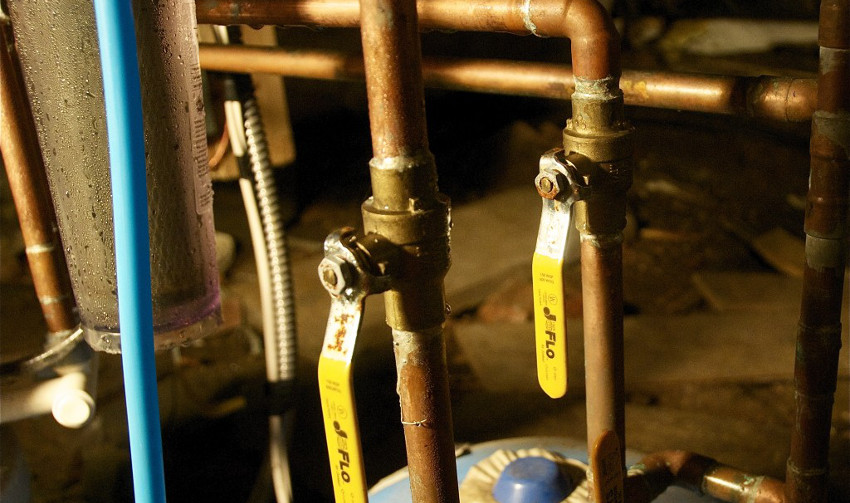When Appliances Go Awry: Typical Issues That Require a Plumber's Expertise
When Appliances Go Awry: Typical Issues That Require a Plumber's Expertise
Blog Article
We have noticed this article involving Why Do My Pipes Make Noises listed below on the net and figured it made sense to discuss it with you in this article.

To detect loud plumbing, it is important to determine first whether the unwanted sounds occur on the system's inlet side-in other words, when water is turned on-or on the drain side. Noises on the inlet side have varied causes: excessive water pressure, worn valve as well as faucet parts, incorrectly linked pumps or other appliances, incorrectly placed pipe bolts, and plumbing runs having way too many limited bends or various other limitations. Noises on the drain side typically come from poor area or, just like some inlet side noise, a layout containing limited bends.
Hissing
Hissing sound that occurs when a faucet is opened slightly generally signals excessive water pressure. Consult your local water company if you think this problem; it will certainly have the ability to inform you the water stress in your area and can install a pressurereducing valve on the inbound water pipeline if required.
Thudding
Thudding noise, usually accompanied by shivering pipelines, when a tap or home appliance shutoff is shut off is a condition called water hammer. The noise and vibration are caused by the reverberating wave of stress in the water, which unexpectedly has no place to go. Sometimes opening up a shutoff that discharges water quickly right into an area of piping including a restriction, joint, or tee installation can produce the very same problem.
Water hammer can typically be healed by setting up fittings called air chambers or shock absorbers in the plumbing to which the trouble shutoffs or faucets are attached. These gadgets allow the shock wave developed by the halted circulation of water to dissipate in the air they have, which (unlike water) is compressible.
Older plumbing systems might have short upright sections of capped pipeline behind wall surfaces on faucet competes the exact same purpose; these can at some point full of water, lowering or ruining their effectiveness. The treatment is to drain the water supply completely by turning off the main water system valve and also opening all taps. Then open up the primary supply shutoff as well as close the taps one at a time, beginning with the faucet nearest the shutoff and finishing with the one farthest away.
Chattering or Shrieking
Intense chattering or shrieking that occurs when a shutoff or faucet is switched on, and that normally disappears when the fitting is opened totally, signals loosened or faulty inner parts. The remedy is to replace the shutoff or faucet with a new one.
Pumps and also home appliances such as cleaning machines as well as dishwashers can transfer electric motor noise to pipelines if they are improperly linked. Connect such items to plumbing with plastic or rubber hoses-never stiff pipe-to isolate them.
Various Other Inlet Side Noises
Creaking, squealing, scratching, snapping, and also tapping typically are brought on by the expansion or contraction of pipelines, generally copper ones supplying warm water. The sounds happen as the pipelines slide versus loose bolts or strike neighboring house framing. You can commonly pinpoint the place of the issue if the pipelines are exposed; just adhere to the sound when the pipelines are making noise. Most likely you will find a loose pipeline wall mount or a location where pipelines exist so near flooring joists or other framing pieces that they clatter against them. Attaching foam pipe insulation around the pipes at the point of get in touch with must correct the trouble. Make certain bands and also wall mounts are safe and secure and also provide adequate support. Where possible, pipe fasteners should be attached to massive structural elements such as foundation walls instead of to framing; doing so lessens the transmission of resonances from plumbing to surface areas that can intensify and also move them. If affixing bolts to framework is inevitable, wrap pipes with insulation or other resilient product where they speak to bolts, and also sandwich the ends of brand-new bolts in between rubber washing machines when installing them.
Fixing plumbing runs that struggle with flow-restricting tight or numerous bends is a last resource that needs to be taken on just after seeking advice from an experienced plumbing contractor. Unfortunately, this scenario is relatively typical in older houses that may not have actually been developed with indoor plumbing or that have seen numerous remodels, specifically by novices.
Drainpipe Sound
On the drainpipe side of plumbing, the chief goals are to remove surface areas that can be struck by falling or hurrying water and also to protect pipes to have inevitable sounds.
In brand-new building and construction, tubs, shower stalls, toilets, and also wallmounted sinks as well as basins need to be set on or against resilient underlayments to lower the transmission of noise through them. Water-saving commodes and also faucets are less loud than traditional versions; mount them as opposed to older types even if codes in your area still allow using older components.
Drainpipes that do not run up and down to the cellar or that branch into straight pipe runs sustained at floor joists or various other framing present especially troublesome sound problems. Such pipelines are big sufficient to radiate substantial vibration; they also bring significant quantities of water, which makes the circumstance even worse. In new building, specify cast-iron dirt pipes (the big pipelines that drain commodes) if you can afford them. Their enormity includes a lot of the noise made by water travelling through them. Also, stay clear of routing drains in walls shown rooms and areas where people collect. Wall surfaces including drains should be soundproofed as was explained previously, utilizing dual panels of sound-insulating fiberboard as well as wallboard. Pipelines themselves can be wrapped with unique fiberglass insulation created the purpose; such pipelines have an impervious vinyl skin (often containing lead). Results are not constantly satisfactory.
Pipe Down! What to Do About Noisy Water Pipes
Banging
Does it sound like someone's hitting your pipes with a hammer every time you run water? The issue could be a phenomenon called water hammer, which happens when a water valve closes suddenly. You'll often hear it when your washing machine stops filling, for example. The momentum and pressure from the water flowing toward the valve create the shockwave that causes the banging noise when the valve closes suddenly. It might not seem like a big deal, but water hammer can cause damage to your pipes, including leaks and joint damage.
One way to ease water hammer is by installing water hammer arrestors. Your plumber can install them near major valves to help cushion the shock of the water when it suddenly stops or changes direction. You might also need to reduce the water pressure coming into your home with the pressure-reducing valve.
Gurgling
Gurgling sounds typically come from drainpipes. This sound happens when the water can't drain properly, usually when there's a clog in the water pipes. Drain clogs often happen due to hair, grease, soap scum or objects that fall down the drain. They can happen suddenly or build up slowly over time.
You can sometimes clear a clogged drainpipe with a plunger to help force the clog through the pipe. A plumbing snake or an auger can also help break up tough clogs. A common plumbing myth is that chemical drain cleaners are safe and effective, but they often don't work and contain harsh chemicals that can hurt you and your plumbing. If you can't remove the clog with a plunger or snake, it's best to call a plumber to help.
Rattling
Water travels through your pipes with lots of pressure, so the pipes are bound to move a little. Pipes should be secured well to keep them from moving too much when water runs through them. If they're not properly fastened or the fasteners come loose, you might hear them rattling when you run water.
Resecuring the pipes can cut down on the rattling noise and prevent damage to the joints of the water pipes. However, many pipes run behind walls where you can't easily access them. A plumber can help determine if loose fasteners are the cause of the rattling and resecure them if necessary.
Humming
If your pipes sound like they're humming, it's likely a water pressure issue. When the water pressure is high, it can cause the water pipes to vibrate and create a humming sound. High water pressure is more common if you have a well for your water, but it can happen with municipal water as well. High water pressure can damage your plumbing and cause leaks.
If you have a well, check the pressure to ensure it's below 55 pounds per square inch. A plumber can test the pressure for you and help adjust the issue if you're not sure how to do it yourself. If you're connected to the municipal water source, your home likely has a pressure-reducing valve near where the water enters your home. You can adjust the screw in the valve to decrease the pressure, but be careful not to lower it too much.
Squeaking
Squeaking or squealing is another common sound you'll hear in your water pipes. This often happens if small components within the plumbing, such as washers or aerators, become loose, dirty or damaged. When this is the cause, the squeaking sound is usually confined to a certain fixture or area of plumbing. Replaced or repairing the part should solve the noise.
If you can hear the squealing sound everywhere in your home, it could be an issue with water pressure. Buildup in the pipes narrows the space for the water, which can cause squealing as the water tries to squeeze through the pipes. Wear and tear on the plumbing system can also cause whistling or squeaking. These situations typically require a professional plumber to diagnose and repair.
https://www.homeserve.com/en-us/blog/home-improvement/water-pipes-making-noise/

I am just very intrigued by How To Fix Noisy Pipes and I am assuming you enjoyed reading the new post. Sharing is nice. Helping people is fun. We enjoy reading our article about Why Do My Pipes Make Noises.
Detail Report this page